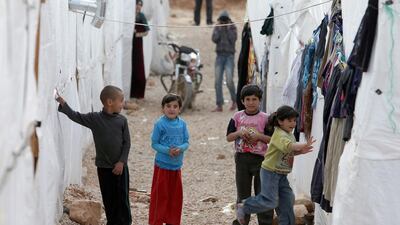Every year the Lebanese say things cannot get any worse than they are, and every year they fully expect that they will. Yet since the start of the Syrian conflict, which has affected Lebanon in myriad ways, the country has avoided anticipated cataclysm.
However, the past year has brought events in Syria much closer to the lives of most Lebanese. The number of Syrian refugees is now estimated at well over a million, putting an immense burden on Lebanon’s antiquated infrastructure.
The economy has also suffered from the war in Syria, which has cut off land communications with the Arab world, preventing Arab tourists from visiting and blocking Lebanese exports. The grim economic mood has also negatively impacted on services and real estate.
In August, things became worse when the Lebanese army and gunmen from Syria’s Qalamoun region bordering Lebanon clashed. This came after the gunmen, including members of Jabhat Al Nusra and ISIL kidnapped three dozen Lebanese soldiers and policemen. Most remain prisoners, while several were killed.
The gunmen were apparently reacting to efforts by the army to close off their supply lines to the Beqaa Valley town of Arsal, a Sunni agglomeration in a mostly Shia region that has long benefited from smuggling. Most of those opposed to the Syrian regime in Qalamoun are from the area itself and were pushed out of Qusayr last year and Yabroud this year.
With winter ahead, the armed groups in Qalamoun feared that they would be forced down from the mountains, making them more vulnerable to attacks by the Syrian regime and Hizbollah. Things have been quieter in recent weeks, amid reports that the gunmen are being supplied, even from Shia villages long involved in smuggling.
Such pragmatism may have become necessary for Hizbollah. The past year was not a good one for the party, as it continues to be trapped in the Syrian quagmire. While it is unlikely that Lebanese Shia will turn against Hizbollah, anxiety levels have risen sharply as Sunni jihadist groups have become more active along the border.
Hizbollah border positions were overrun by gunmen from Qalamoun in early October. They filmed the operation, showing how close they had come to a Shia village below. This was so worrisome that Hizbollah’s leader, Hassan Nasrallah, later travelled to the Beqaa to reassure his coreligionists.
The Qalamoun region is vast and Hizbollah and the Syrian army have been unable to defeat, or dislodge, the opposition groups. Hizbollah and the Syrian regime have pressed the Lebanese army to play a more active role against opposition gunmen for precisely this reason, being unable to make decisive gains on their own.
Another source of anxiety in Lebanon has been Sunni-Shia relations in light of Syria’s war. The feeling that Hizbollah is struggling has reinvigorated Sunnis, who were repeatedly humiliated by the party in the past nine years. Such tension is worrisome given the potential appeal of jihadists in Syria.
While Lebanon’s Sunnis are mostly moderate, their political leader, Saad Hariri, a former prime minister, has been out of the country for three-and-a-half years, after he was ousted by Hizbollah. Extremists have benefited from the vacuum.
To calm tensions, Hizbollah and Mr Hariri’s Future Movement had talks in December. Expectations are low that it will achieve anything, but it did show that Hizbollah recognises Mr Hariri as the main Sunni interlocutor. The former prime minister, in turn, realises that, his differences with Hizbollah notwithstanding, everyone would lose from a sectarian war sparked by events in Syria.
With so much attention on Syria, the Lebanese could be forgiven for failing to remember the major domestic crisis of the past year: the inability of parliament to elect a successor to president Michel Suleiman.
This is not the first time Lebanon has found itself without a president, election of which is one of parliament’s main duties. Consequently, Lebanon has continued to be run by the government of prime minister Tammam Salam. Parliamentary elections this year were postponed for a second time to avert a constitutional vacuum, as a government cannot be formed without a president in place.
This lack of institutional renewal has weighed heavily on the Lebanese. Hizbollah doesn’t want a president amid regional uncertainty, fearing that he or she may turn against the party. Indeed, Mr Suleiman became critical of Hizbollah during his term, and the party wants to avoid that experience again.
Nor is Hizbollah willing yet to break with its ally Michel Aoun, who wants to become president. Mr Aoun has refused to send his parliamentarians to vote, preventing a quorum, in the hope that such blackmail will ultimately get him elected.
Blackmail has become a recurring feature of Lebanon’s political landscape lately, marked by brinkmanship followed by belated deals to avoid the worst. That’s not how to run a country, but as 2015 arrives there are no signs that such recklessness will stop.
Michael Young is opinion editor of The Daily Star in Beirut
On Twitter @BeirutCalling


